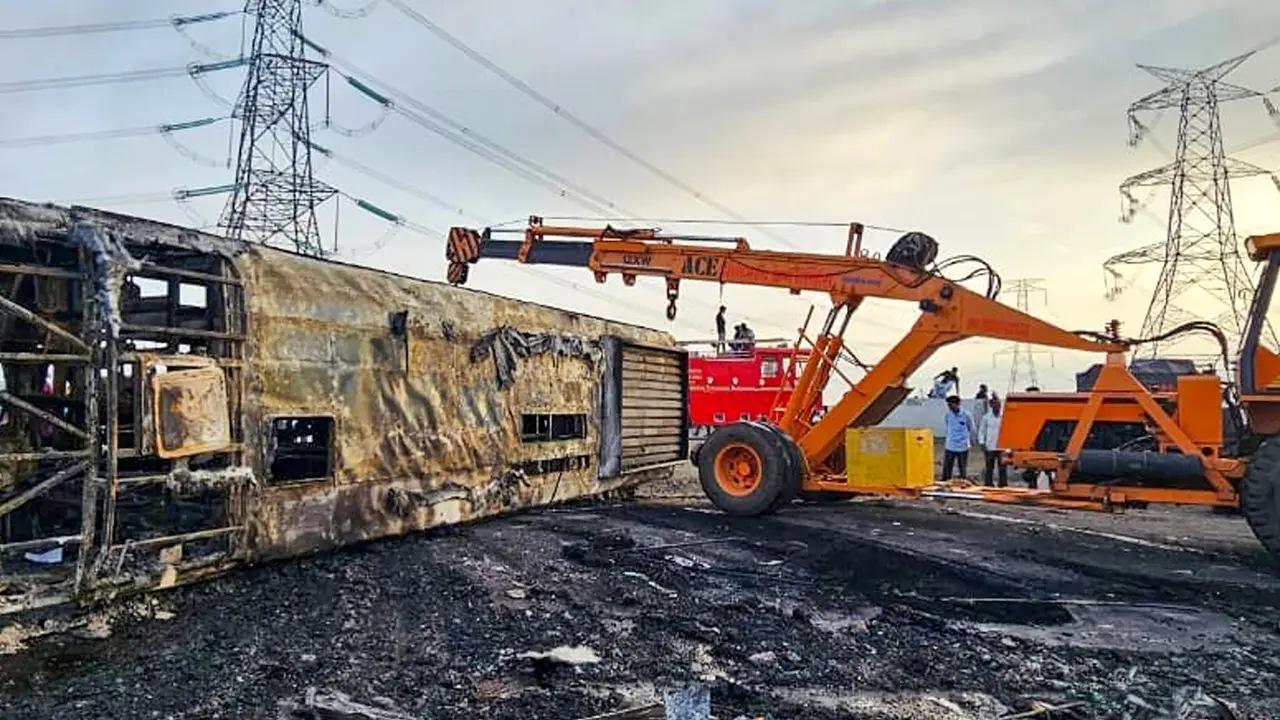The private bus that met an accident on Maharashtra's Samruddhi Expressway in which 25 passengers were charred to death was given the fitness certificate nearly 9 months after it was tested for roadworthiness

File Photo/PTI
The private bus that met an accident on Maharashtra's Samruddhi Expressway in which 25 passengers were charred to death was given the fitness certificate nearly 9 months after it was tested for roadworthiness, official records show.
ADVERTISEMENT
Activists and former regional transport office (RTO) staffers have termed the inordinate delay between the two processes an “administrative lapse”, saying it leaves scope for malpractices. Maharashtra has nearly 67,000 registered contract carriage buses, as per officials.
Besides demanding “strict action” against those behind this delay in this particular case, they have also stressed the need for taking “concrete steps” to improve the system. A fitness certificate is mandatory for all commercial vehicles.
The private sleeper coach bus with registration number MH29 BE 1819 rammed into a pole on the Mumbai-Nagpur high-speed carriageway in Buldhana district on July 1 before hitting a divider and bursting into flames. While 25 passengers were charred to death, eight others, including the driver and his assistant, survived.
As per Amravati RTO's primary report filed on the day of the accident, the fitness certificate of the bus, registered at Yavatmal RTO in January 2020, was valid up to March 10, 2024.
The commercial vehicle's records, however, throw up a tale of unexplained procedural delay.
According to RTO officials, its fitness certificate was approved on November 29, 2022, nearly 9 months after it was tested for roadworthiness on March 10, 2022.
An RTO official said that Motor Vehicle Inspector Sachin Nikam made an “entry” (filling details on the national vehicle registry 'Vahan') on November 19 and “verified” it the same day. He “approved” the fitness certificate of the vehicle on November 29, 2022.
Deputy RTO Dnyaneshwar Hirde, who holds the additional charge of the Yavatmal office, did not respond to specific queries about the fitness certificate of the bus.
In a written reply to queries from PTI about the renewal of fitness certificates of commercial vehicles, a transport department spokesperson said that Motor Vehicles Inspectors should approve the fitness certificate within a day or two after a vehicle's testing is conducted, as per the procedure laid down under rule 62 of the Central Motor Vehicles Rules, 1989.
Before the bus' fitness certificate was renewed, the Aurangabad RTO in August 2022 and Nagpur Rural RTO in October 2022 had issued two challans to it for running with an expired fitness certificate.
Records show both challans were promptly settled, which according to activists, raises more questions.
“If the bus' fitness certificate was valid, why did RTOs issue challans to it twice and why would the owner pay such a hefty fine,” asked VK Duggal, a director of NGO '3A Road Safety Foundation'. Duggal suspects the bus might have been granted fitness without the mandatory testing.
As per a directive of the Bombay High Court, videography is mandatory while testing a commercial vehicle for the renewal of the fitness certificate.
The government should make the video recording of the testing of the ill-fated bus public, said a few activists.
Asked about the challan issued to the bus on October 11, 2022, for plying with an expired fitness certificate, Rajabhau Gite, RTO of Amravati, also holding additional charge of Nagpur RTO, said that the fitness of the bus was not valid on that day.
“The bus was inspected in March 2022, but the tax was pending at that time. So the certificate of fitness was not valid in October 2022 when the challan was issued. Verification and approval were done by the inspector in November 2022,” Gite replied.
However, an RTO inspector called this a “grey” area.
A retired transport department official, who did not wish to be named, said that the bus' fitness should have been ideally approved the same day or within a couple of days after testing was done.
“It was a sheer administrative lapse,” said the retired official, adding that the responsibility for the delay in giving the fitness certificate lies with the inspector concerned.
Pune resident Shrikant Karve, whose PIL in the high court a few years ago had led to the introduction of many elements to the vehicle certification processes in Maharashtra, said that in some RTO offices, fitness certificates are being issued to buses without following the HC guidelines.
“This case has highlighted that the transport commissioner's office also failed to supervise and keep a check on the fitness approval process,” Karve said, adding that the government should take strict action against those responsible in this case.
Notably, the bus was issued a new 'pollution under control' certificate, from a Yavatmal-based PUC centre about nine hours after it was gutted in the fire. The transport department has taken action against the PUC centre.
As per rule 62 of the Central Motor Vehicle Rules 1989, fitness certificates are mandatory for all commercial vehicles “trucks, tempos, taxis, auto rickshaws, buses, and trailers” fitted with yellow number plates.
Motor Vehicle Inspectors at RTO offices carry out a physical inspection of vehicles and drive them to test their roadworthiness before issuing the fitness certificate, which is valid for a year for old transport vehicles up to 8 years of age and two years for new ones. (PTI)
 Subscribe today by clicking the link and stay updated with the latest news!" Click here!
Subscribe today by clicking the link and stay updated with the latest news!" Click here!







